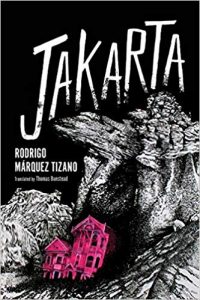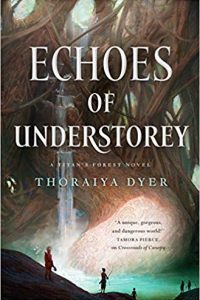Ian Mond Reviews Jakarta by Rodrigo Márquez Tizano
 Jakarta, Rodrigo Márquez Tizano (Coffee House Press 978-1566895637, $16.95, 160pp, tp) November 2019.
Jakarta, Rodrigo Márquez Tizano (Coffee House Press 978-1566895637, $16.95, 160pp, tp) November 2019.
The fact that Rodrigo Márquez Tizano’s debut, Jakarta, (originally published in 2016 and translated by the always brilliant Thomas Bunstead) does not take place in Indonesia is one of the least puzzling aspects of this hallucinogenic novel. The setting is the city of Atlantika, a crumbling dystopia, struggling to recover from the Z-Bug, the latest iteration of a pathogen that re-occurs every five to ten years. When we first meet our unnamed protagonist, he is holed up in his apartment with his girlfriend Clara, both of them mesmerized by a stone that Clara found, “opaque and smooth to the touch… with a pink spreading glow.” In the light of the stone, past, present, and future blur together. Our protagonist recalls his fifth-grade teacher, a wrinkled Nun who taught “a geography of sorts” and who would begin the class with a call and response – the name of a Country followed by its capital city (Indonesia:Jakarta). It’s at school he befriends Morgan, who “was forever making things up.” Years later they both join the Z-Brigade, where they combat the Z-Bug by crawling through the tunnels of Atlantika exterminating the rats and children infected by the virus. In between these flashbacks, our narrator guides us through the ruined streets and alleyways of Atlantika, and particularly the city’s obsession with Vakapy (a modified form of jai alai) that was once played in stadiums but now exists in a virtual world where spectators bet on “nearly 750 different kinds of plays… [with] no limit to the number of calls you can make.”
Where it was simple to draw a line between Hiroko Oyamada’s The Factory and the work of Franz Kafka, it’s a fool’s game trying to piece together the multiple influences that inform Jakarta. At times, the novel is a bildungsroman reminiscent of Stephen King’s “The Body”, a plague narrative with overtones of Daniel Defoe’s A Journal of the Plague Year, a cyberpunk dystopia, and an anthropological study of the city. Mostly Jakarta is its own thing. By far the most compelling sections are those dealing with the Z-Bug. It’s not so much the visceral nature of the pandemic – most killer flu narratives plumb similar ground – but rather how Tizano uses these sections to discuss the deep divisions in Atlantikan society. There’s the one percent who live in high-rise buildings well away from the hoi polloi and the possibility of infection, and there’s the Albynos, brought to the city as slaves, who continue to experience prejudice and discrimination, in spite of their value fighting the Z-Bug. The Albyno’s “sensitivity to auditory stimuli… altered by hundreds of years’ proximity to the earth’s magnetic fields” allows them to more efficiently hunt and kill infected rats and children deep in the bowels of Atlantika.
Although Jakarta is a short novel (similar to The Factory in length), it’s not a quick read. The non-linear structure, the density of the prose, the general weirdness of the setting mean you have to pay attention. That’s a good thing because, while there are parts of Jakarta that are a little too abstract for my tastes – the climax in particular – Tizano’s distinctive style and his boundless imagination are a thrill to read.
Ian Mond loves to talk about books. For eight years he co-hosted a book podcast, The Writer and the Critic, with Kirstyn McDermott. Recently he has revived his blog, The Hysterical Hamster, and is again posting mostly vulgar reviews on an eclectic range of literary and genre novels. You can also follow Ian on Twitter (@Mondyboy) or contact him at mondyboy74@gmail.com.
This review and more like it in the December 2019 issue of Locus.
 While you are here, please take a moment to support Locus with a one-time or recurring donation. We rely on reader donations to keep the magazine and site going, and would like to keep the site paywall free, but WE NEED YOUR FINANCIAL SUPPORT to continue quality coverage of the science fiction and fantasy field.
While you are here, please take a moment to support Locus with a one-time or recurring donation. We rely on reader donations to keep the magazine and site going, and would like to keep the site paywall free, but WE NEED YOUR FINANCIAL SUPPORT to continue quality coverage of the science fiction and fantasy field.






